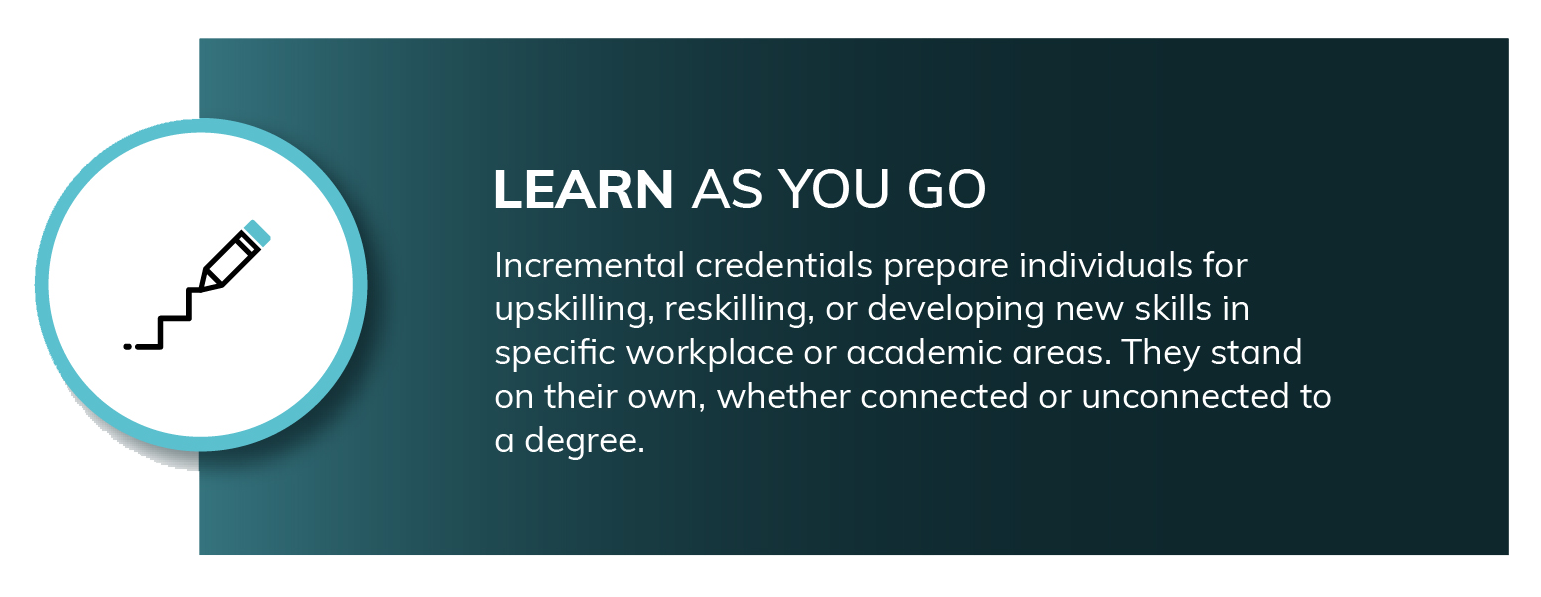
The features of Learn As You Go credentials promote more equitable outcomes, including the ability for credentials to stand on their own or be connected to other credentials. They can also target specific areas of employability and/or support nontraditional learners such as Black students seeking bachelor’s degrees—who are twice as likely as other bachelor’s students to have additional responsibilities as caregivers or full-time workers. In using the Learn As You Go model, it is important to adopt practices such as offering on- and off-ramps for learning and to provide wraparound services.
The Attainment for All: Equity in Postsecondary Pathways briefs explore the challenges and innovative practices involved when colleges offer wraparound services. The goal is to provide holistic support to students from low-income families, who are first-generation, nontraditional, and students of color. Such services provide academic, health, socio-emotional, familial, financial, and logistical support. The briefs share examples of major issues that wraparound services help to address, including lack of flexibility in financial aid, housing insecurity, transportation challenges, mental health issues, and difficulties in balancing work and academics.
Among the examples the briefs highlight is The City University of New York (CUNY)’s Accelerated Study in Associate Programs, which have proven to be effective by research led by MDRC. According to that research, the ASAP program nearly doubled graduation rates for participants after three years, and after six years ASAP participants continued to have higher rates of completion and shorter time to degree. ASAP provides a host of wraparound services for participating students. The program removes financial barriers for students through scholarships, and by offering financial assistance for transportation and the cost of textbooks. Students meet with experienced academic advisors regularly to receive comprehensive academic, social, and personal support. They also meet with career specialists to develop career goals and competencies.
Other wraparound service initiatives include:
The North Carolina Community College Child Care Grant Program provides up to $24 per day to assist student-parents with child care expenses while enrolled. Another study demonstrates the value in providing targeted supportive services that help single-mother students meet their families’ basic needs and manage their time demands. The evidence indicates that a combination of child care, case management (also called coaching), and financial assistance can improve single mothers’ ability to graduate. In a set of articles from Goodwill, we see how Chelsea Rucker, a single mother of two, launched a career with Google after completing an IT course. We also meet another single mother, Kara Isreal, who followed a similar path to achieve her lifelong career goal and obtain a job with Accenture.
By partnering with government programs and agencies, such as the Department of Veterans Affairs, institutions can increase the likelihood that students will take advantage of the benefits available to them. Additionally, for qualifying students and their families, assistance from programs such as Temporary Assistance for Needy Families (TANF), the Special Supplemental Nutrition Program for Women, Infants, and Children (WIC), and Supplemental Nutrition Assistance Program (SNAP) can help eliminate barriers to success in pursuing postsecondary credentials. Some Head Start programs have dedicated partnerships with colleges, offering high-quality child care and other resources to income-eligible families. The National Skills Coalition’s Career Pathways SNAP E&T Project works with five states— Arizona, Connecticut, Michigan, New Mexico, and Virginia—to leverage the SNAP E&T program. The program works to increase postsecondary enrollment and completion, provide supportive services, connect students to quality jobs that offer economic mobility, and meet the needs of local employers.

Credential As You Go has acquired three phases of funding to date. Lumina Foundation funded Phase I, resulting in the Incremental Credential Framework for testing. The Institute of Education Sciences, U.S. Department of Education funds Phase II (Grant R305T210063), which focuses on rapid prototyping of and research on incremental credentials with a national campaign. An anonymous private donor fund at the Program on Skills, Credentials & Workforce Policy at George Washington University funds the development of the prototype Learn and Work Ecosystem Library. Walmart funds Phase III, which focuses on systems change for expansion and sustainability of incremental credentials. The opinions expressed are those of the authors and do not represent views of Lumina Foundation, Institute of Education Sciences, the U.S. Department of Education, Walmart, or George Washington University.